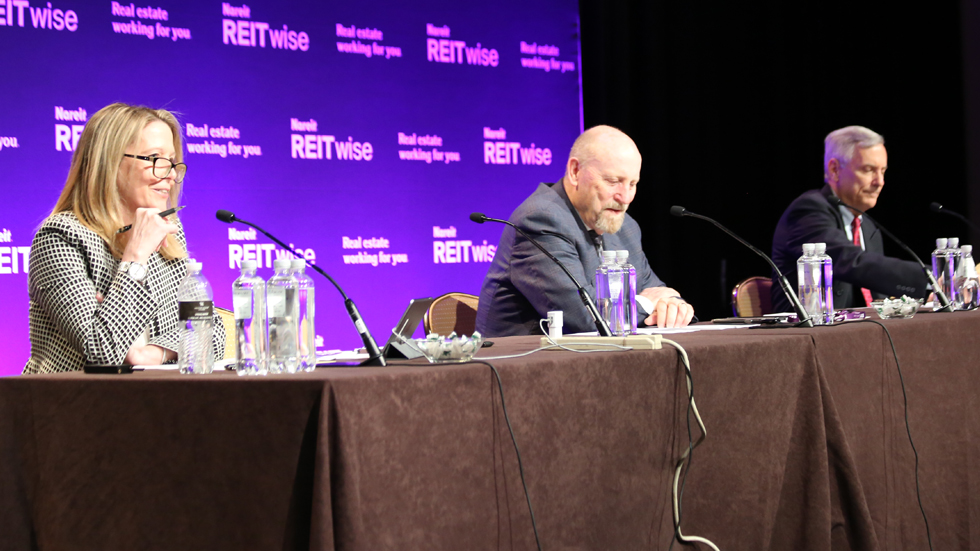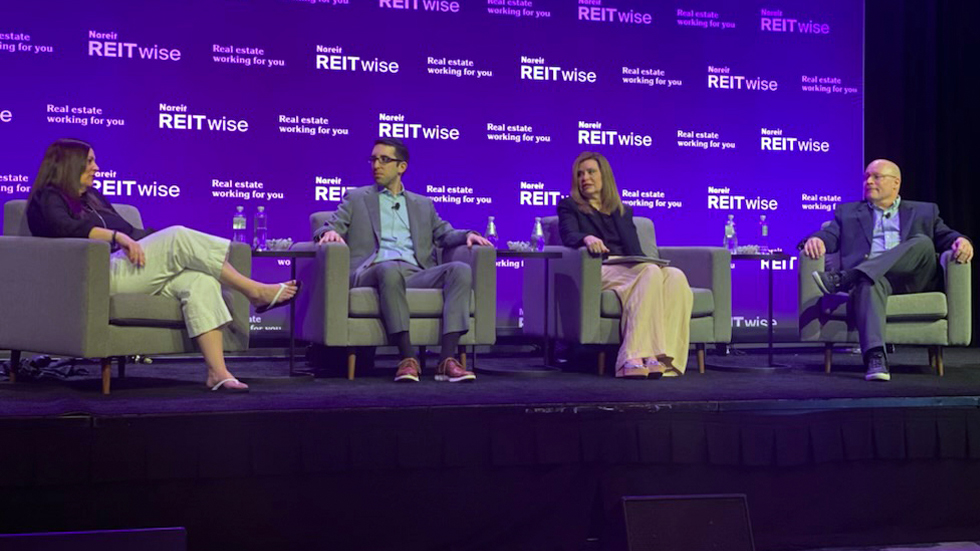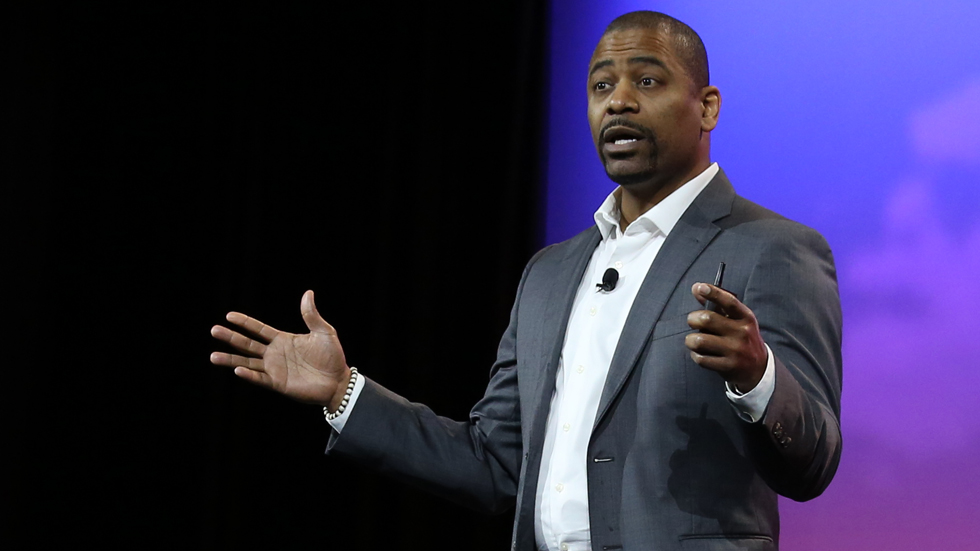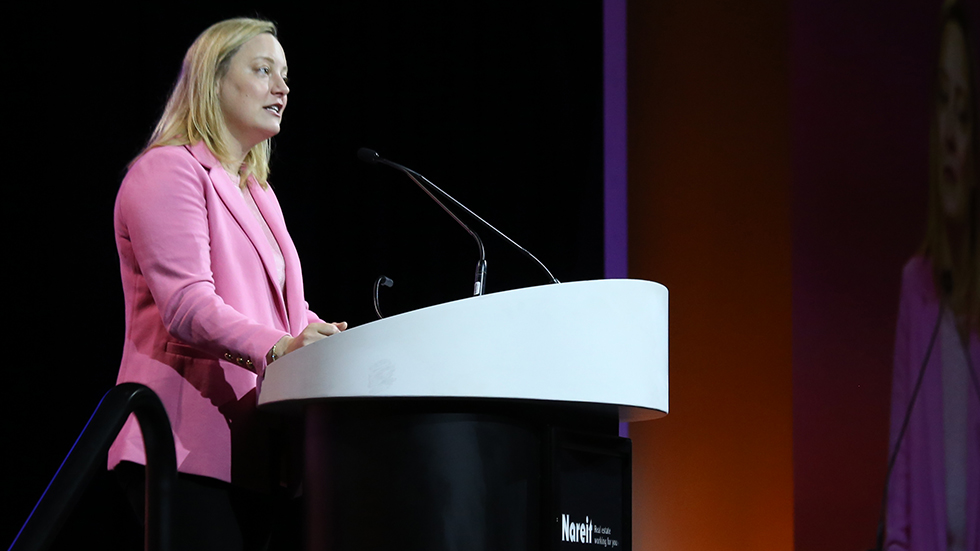Nareit’s REITwise 2022: Law, Accounting & Finance Conference convened almost 850 real estate executives and REIT industry professionals last week. The three-day educational program focused on current issues of importance for REITs and publicly traded real estate companies in all areas of legal, financial, tax, and accounting operations. The event attracted attendees from 225 companies, including 125 member REITs, and featured almost 80 panelists and keynote speakers.
Read on for a recap of general and concurrent session presentations.
Opening General Session: State of the Capital Markets
Nathan Brunner, managing director, real estate, gaming and lodging investment banking at J.P. Morgan Chase & Co. and REITwise 2022 program director, moderated the REITwise 2022 opening general session. Panelists included: Ryan Dennison, SVP, capital markets and investor relations at American Campus Communities, Inc.; Stephen Horn, EVP and COO at National Retail Properties, Inc.; and Christopher Lucas, managing director and lead REIT analyst at Capital One Securities. The panel engaged in a wide-ranging discussion of capital markets developments including the impact of increased interest rates and higher inflation on REITs and the broader commercial real estate markets. The panel also debated the pros and cons of REITs entering into forward equity contracts and reviewing M&A and activist investors in the last two years, as well as discussing future activity in 2022. Also, the panel discussed investors’ increasing appetite for ESG information and evidence that companies are making meaningful and observable progress in this area.
What’s on the Minds of SEC and FASB Leadership?
Keri Shea, SVP of finance and treasurer, AvalonBay Communities, Inc., spoke with SEC Acting Chief Accountant Paul Munter and FASB Board Member Gary Buesser about their respective standard setting priorities. Munter provided his thoughts on the definition of materiality and recent SEC rulemaking proposals on cybersecurity and climate change disclosures. Buesser provided attendees with a status update on projects relevant to the real estate industry, including segment reporting, accounting for joint venture formation, and improving the accounting for business combinations and asset acquisitions.
Operational/Day-to-Day Tax Issues
Moderated by Kristin Myers, a partner at Deloitte LLP, the operational tax panel included: Etan Bluman, the tax director at Urban Edge Properties; Shari Thakady, SVP, tax at RPT Realty; and Mark Patterson, SVP, taxation at Duke Realty Corporation. They noted the importance of creating and ensuring a collaborative team culture when dealing with issues such as employee recruiting and retention; working with outside tax providers; using tax technology to create efficiencies; and ensuring that the tax department is involved in making business decisions.
REIT General Counsel Issues in the Post-Pandemic World
Moderator Taylor Kessel, SVP and general counsel at Xenia Hotels & Resorts, Inc., led panelists Ann Colussi Dee, EVP, general counsel and corporate secretary at Duke Realty; Michael Herman, SVP and general counsel at Regency Centers; and Nancy Vu, SVP, general counsel and secretary at Park Hotels and Resorts in this session. The panel discussed the integration of general counsels into their company’s ESG efforts, including how they are working with their boards and board committees to respond to investors’ increasing appetite for more information and how to include ESG metrics in compensation programs. The panel commented that the recent SEC proposed rule on climate change disclosure would present companies with significant new challenges in reporting auditable information on a timely basis. They also discussed how companies are ramping up their cyber security efforts and how they are enlisting outside experts to help guide their efforts with board oversight. The panel emphasized that companies should have a robust dialogue with investors to discover how companies can best meet their information needs. Lastly, the panel discussed how general counsel are meeting the challenges of transitioning away from a fully remote work environment along with the challenges of retaining and attracting new talent during the Great Resignation period.
Emerging Tax Issues
Kristin Chang Winckler, partner of Ropes & Gray LLP joined panelists Kelly Xu, tax director at Brandywine Realty Trust; Sarah Beth Rizzo, partner at Skadden; Gerald Thomas II, partner at McGuire Woods LLP; and Mark Kirshenbaum, principal at EY, for the emerging tax issues panel. They discussed some of the difficult issues and recent developments involving the prohibited transactions safe harbor, including when the two-year holding period begins; reviewing an unsolicited offer; and the implications of selling interests in a subsidiary entity. They also analyzed recent private letter rulings involving the REIT gross income tests and some tax-related issues involving REIT M&A activity, including the purchase of tax insurance.
REIT M&A
Moderator Adam Emmerich, partner at Wachtell Lipton Rosen & Katz, led panelists Laurel Durkay, managing director and head of global listed real assets at Morgan Stanley; James Hanks, Jr., partner at Venable LLP; and Kendal Sibley, partner at Hunton Andrews Kurth LLP. The panel observed that even after REIT prices rebounded greatly in 2021, with many companies no longer trading at the discounts found in 2020, there was still a great deal of private capital looking to be deployed and opportunities for REIT-to-REIT combinations that increase scale and lower cost-of-capital, leading to the thought that there would still be a significant amount of M&A activity this year. The panel reviewed some of the tax issues confronting REIT M&A transactions, especially with only one of the companies having used the UPREIT structure and some of the options when the acquiring company looks to dispose of unwanted assets. They also discussed exclusive forum bylaw provisions and the differing duties of care a board must observe under Maryland law when the company continues or is dissolved in an acquisition.
PCAOB and Non-Legal Accounting Update
ToniAnn Sanzone, CFO at W.P. Carey, led a discussion of the SEC’s current organization and major agenda topics, and a discussion of the current projects of the PCAOB and its standard setting agenda. Bill Staffieri, partner at PwC, indicated that at the top of the SEC’s agenda is its climate change disclosure proposal released on March 21. Staffieri also indicated that areas of SEC focus include enforcement of Commission rules, cryptocurrency and digital assets, and the reopening of the comment period for the pay for performance proposal. Tara Pendleton, professional practice director at BDO USA, LLP, reviewed the current organization and the agenda of the PCAOB. Hot agenda topics include supervision of audits involving other auditors, changes in the use of data and technology in the conducting of an audit, and audit evidence.
Lunch Session: DEI: Measuring Progress. Improving Performance. Increasing Productivity
Dr. James Pogue, CEO of James Pogue Enterprises, was the lunch session speaker on March 24. Pogue discussed the challenges corporations face and opportunities they have in the area of diversity, equity, and inclusion. Dr. Pogue provides thought leadership to leaders and organizations to help them address DEI issues “directly and significantly.” As the president and CEO of JP Enterprises, he has spearheaded the development of the DIBs Model, focused on diversity, inclusion, and bias. An outgrowth of research and grounded in theory, this model spawned the DIBs Assessment, a tool used to measure where an organization, team or individual are on their diversity journey, to provide the best opportunity for strategic recommendations and change.
Finance and Accounting Transformation
John D’Angelo, managing director, U.S. real estate solutions leader at Deloitte, led a discussion of how the real estate industry is changing and why companies must think strategically in terms of both work force and technology. Jody Hill, principle and enterprise transformation leader at Deloitte Consulting, added to the discussion focusing on operating models and enterprise resource planning. D’Angelo emphasized the need for standardized and high-quality data. Panelists Barry Hytinen, EVP & CFO at Iron Mountain; Matt Jordan, EVP, CFO and treasurer at The RMR Group; and Molly Syke, VP of accounting and controller at Apartment Income REIT, shared a wide range of experience creating strategic visions of the future of work in their companies and of technology needs to respond to the changes in their businesses and to enhance their competitive edge.
Partnership Tax Issues
Moderated by Abe Schlisselfeld, senior managing director at CBIZ Marks Paneth LLC, the partnership tax panel included: Steve Beinke, SVP, tax at American Campus Communities; Terence Cuff, senior counsel at Loeb & Loeb LLP; Neil Furmanski, partner at RSM US LLP; and Ivy Jones, partner at Sidley Austin LLP. Like the operational tax panel, this panel also stressed the importance of working collaboratively and early with both legal and accounting outside advisors when considering partnership-related transactions. Beinke suggested including as an exhibit to all partnership agreements an exhibit with hypothetical numbers to illustrate the economics of the deal. Jones explained the importance of precedential guidance from the IRS concerning subsidiary REITs of publicly offered REITs.
Corporate Governance
Panel moderator and REITwise 2022 Program Director Rob Del Priore, EVP, CAO and general counsel of MAA, led panelists Laurel Durkay, managing director and head of global listed real assets at Morgan Stanley; Khalid Husain, head of ESG for Cohen & Steers; and Sherry Rexroad, CFO at Store Capital Corporation. The panel focused on investor views on corporate governance and how investors are seeking not only more detailed ESG information but also management’s qualitive approach to how ESG is integrated with the company’s operations and investment activities. The panelists observed that REIT boards are more engaged in human capital management than ever before and investors are curious about details of how employees are incentivized and motivated. Lastly, they also indicated that board refreshment has become a good opportunity to add new types of expertise to board representation to address challenges and opportunities beyond the traditional real estate and financial expertise on REIT boards.
Breakfast General Session: Political Outlook
Anna Palmer, co-founder of Punchbowl News, was the keynote speaker for a political outlook general session over breakfast on March 25. Palmer discussed a general outlook on the current state of Washington affairs and looked ahead to the next election cycle and what attendees could possibly expect. Punchbowl News is a news community focused on power, people, and politics in Washington launched in 2021. The company covers the congressional leadership and the White House, and tracks the industries and companies trying to influence them. The company is named after the Secret Service nickname for the Capitol.
General Session: State of the Real Estate Markets
Spencer Levy, global chief client officer and senior economic advisor for CBRE, addressed REITwise in a general session on the state of the real estate markets. Levy gave a wide-ranging talk connecting the broader global economic recovery with an optimistic outlook for commercial real estate. Spencer made the case that the U.S. will see robust growth in 2022 and 2023, with moderate inflation in 2023 before economic growth slows in 2024 and beyond. Levy has a cautiously optimistic view of the evolving office sector, is positive on retail, and suggests investors take a cautious approach to multifamily and industrial/logistics. Levy also stressed the strong investor demand for new and emerging sectors, including senior housing and health care, life sciences, cold storage, data centers, cell towers, and others. Finally, he noted that investors are increasingly expecting strong ESG performance, irrespective of sector or geography.
Building Out the Finance Function in ESG Reporting
Moderated by Jennifer Leitsch, managing director at EY, the ESG reporting session included: Michael Chang, VP, energy and sustainability, Host Hotels & Resorts, Inc.; Sandra Burns, partner, audit, EY; John Isakson, CFO, Preferred Apartment Communities, Inc.; and Neil Stewart, director of corporate outreach, senior market leader, Canada, Value Reporting Foundation. This panel focused on how to leverage the finance and accounting functions to provide process, controls, and substantive support for developing ESG disclosures. Panelists discussed the latest developments in ESG reporting requirements at the International Sustainability Standards Board and at the SEC. They also raised emerging accounting considerations for ESG-motivated business transactions and the evolving assurance landscape.
REIT Tax Conundrums
Nabil Andrawis, EVP and director of taxation at LXP Industrial Trust and REITwise 2022 program director, moderated the REIT Tax Conundrums panel, which included Darren Chesser, VP tax at AvalonBay Communities; Craig Stern, managing director at Mazars USA LLP; and Jennifer Weiss, partner at Greenberg Traurig, LLP. The panel analyzed a number of different situations involving short-term rentals, parking arrangements, and the treatment of certain interests as stock or debt.
SEC Legal Update
David Slotkin, partner at Morrison & Foerster, led a panel of securities law experts and practitioners who addressed the Securities & Exchange Commission’s (SEC) ambitious regulatory agenda. Panelists included: Nareit Corporate Governance Council Co-Chair Scott Fenster, EVP, general counsel and corporate secretary of Equity Residential; Sonia Gupta Barros, partner at Sidley Austin LLP; and Yoel Kranz , partner at Goodwin. The panel examined the SEC proposed rule on climate change disclosure that was released on March 21. They noted the breath and depth of the proposed disclosures and how issuers such as REITs would need to adopt their current sustainability reports to the more prescribed and auditable approach contained in the proposal. The panelists noted the challenges that REITs would need to resolve, especially with Scope 3 emissions for which they might not be able to obtain accurate and verifiable data from their tenants. The panel also examined the new proposed SEC rule on cybersecurity disclosure, noting that the four-day disclosure requirement might inhibit companies that are working to resolve cyber breaches. The panel also discussed the proposed SEC rules regarding filings by major shareholders and how those new rules could impact a REIT’s ownership restrictions in its charter to protect the REIT’s tax status. Finally, the panel discussed how the new final proxy access rule might provide activist investors with a greater chance to have their slate of directors considered in a proxy fight, as well as how companies could plan for these contests by adopting strong advance notice bylaws.




